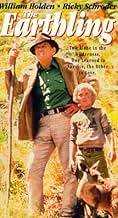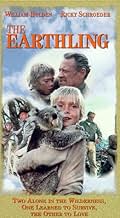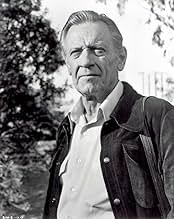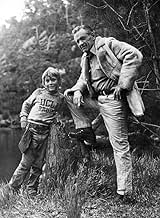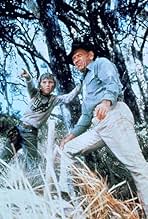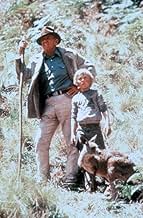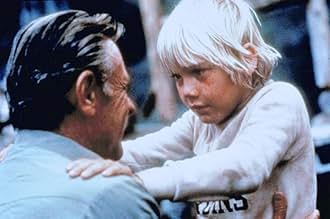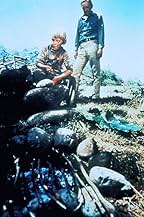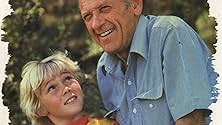Aggiungi una trama nella tua linguaDiagnosed with a terminal form of cancer, Patrick Foley has returned to his native Australia to die in the peace and quiet of the wilderness. His simple plan is complicated, however, when he... Leggi tuttoDiagnosed with a terminal form of cancer, Patrick Foley has returned to his native Australia to die in the peace and quiet of the wilderness. His simple plan is complicated, however, when he meets a young boy who has just lost his parents.Diagnosed with a terminal form of cancer, Patrick Foley has returned to his native Australia to die in the peace and quiet of the wilderness. His simple plan is complicated, however, when he meets a young boy who has just lost his parents.
- Regia
- Sceneggiatura
- Star
- Premi
- 1 vittoria e 2 candidature totali
- Dalton
- (as Dawn Schroder)
- Molly Ann Hogan
- (non citato nei titoli originali)
Recensioni in evidenza
It's not a family film in the Disney sense, but it's a true family film in the spiritual sense. Sometimes the happy ending teaches that life is hard, suffering has a cause and an end, and within us lies the answer to the cessation of suffering: We can endure and find happiness, so long as we remember to find love.
Holden's performance was right-on, playing the embittered but compassionate mentor to Shroeder's traumatized child. The cinematography was outstanding, the Australian landscape was full of color and the story line quite refreshing.
Only in the movies could we have the strange tale about one of the two protagonists dying of cancer, directed by someone who was himself dying of the same. Peter Collinson was terminally ill and knew it when he was directing The Earthling. I'm sure his cast didn't know it though. His own plight might have been what attracted Collinson to the project.
According to the Citadel Film series book, The Films Of William Holden, Collinson was especially hard on young Rick Schroder during the making of The Earthling. So much so that Holden had to intervene and the two bonded.
Which may have helped the film because three quarters of it is only dealing with Holden and Schroder on screen. The two really play well together.
Holden has returned to Australia to die where he grew up in a very rugged part of the Blue Mountains of New South Wales. Heading in the same general direction are Jack Thompson and Olivia Hamnett with their child Rick Schroder on a camping holiday. But when their camper goes off a cliff killing the parents and Schroder is left alone in the wilderness, he's lucky to find Holden.
But Bill proves to be a stern taskmaster. He can't tell him that it would be worse to go back, that it's farther than his old homestead. He has to teach Schroder and hope he learns well, the tools needed for survival in the wild. The bulk of the film is concerned with just that.
Collinson died and some scenes were shot afterward, the ending you see is not what Collinson had in mind. But who knows what he did have in mind as the disease ruled him as surely as it ruled Holden's character. The viewers will have to judge for themselves.
Rick Schroder never forgot William Holden and when he married, he named his first child Holden Schroder in honor of the movie legend who was also battling some demons of his own, but took time to help and befriend a young child player.
I think if Rick Schroder reads this review he'd like me to honor William Holden as well. And so this review is dedicated to William Holden one of the cinema's brightest stars.
I've seen this excellent film three times -- always on late-nite TV. Leonard Maltin gives it two-and-a-half stars: "OK family drama." Yet, over half of its IMDB viewers rated it a 10. Why on earth hasn't it received wider public acclaim??!
At 62 (this was his next-to-last film), Holden looks like he really is terminally ill. The cockles of his heart never are warmed to the kid (that we can see, anyway).
He's bone-weary, making his painful way to the ruins of his long-deserted family home to die, But this squalling, spoiled, self-centered kid is stranded. The man would like to ignore him, but the boy's obvious vulnerability won't let him. And as his strength fails, he could use some help himself.
So they make their way, conjointly, to his dying-place. And on the way, he tries to teach the boy how to survive in the wilderness -- for the child will soon be utterly alone -- and reach civilization.
How and what he teaches him is fascinating -- both practical and subtle. He plunges the city-bred boy from pampered narcissism to basic verities and respect for life and Life. In turn, the child's unevadable need forces this bitter, used-up man to dredge up his humanity and, with his last energy, give it out; to do the right thing.
Both of them change and grow. And it's quietly beautiful. In a sense, this is a coming-of-age film with no age boundaries. Maybe it's a "coming-into-humanity" film. See it. And grasp again (or for the first time) the dignity and beauty that humanness can be.
In a story that mirrors the real-life illness of Collinson, an old American returns to his boyhood home in the Australian outback. He has been diagnosed with cancer and has decided to see out his final days in his favourite place. However, the trek to his old family home is a long and arduous one, deep into the outback. En route, he happens upon a young boy whose family have been killed in a horrific camper van accident. Initially annoyed to be lumbered with the boy (Schroeder), the old man eventually teaches him the art of survival in the wilderness and actually grows to love him.
This strange outdoor adventure film feels like it was originally conceived as a family production. However, somewhere along the line it became tougher than that. Perhaps Collinson had directed too many violent thrillers (The Sellout, Open Season, The Penthouse) to judge the tone needed for a family film. Perhaps his imminent death had made him cynical and bitter. Either way, the cruel attitude evident in Collinson's direction - via Holden's character - lends the film a highly unusual element of grittiness. Some critics feel that the film suffers as a result, but I disagree. The film suffers from an over-reliance on wldlife shots and occasional dull stretches, but not because of the tough edge of its main character. The Earthling isn't great, but it's certainly interesting enough to be worth a viewing or two.
Lo sapevi?
- QuizPublicity for this film in 1980 stated that this movie was the most expensive film ever made in Australia. Reportedly, this picture had a budget of $5 million (Australian).
- BlooperWhen the camper smashes into the bottom of the ravine, it lands on its side and is split in two. After the boy has reached the bottom of the cliff to sit by the rear bumper, it is simply lying upside down in one piece.
- Citazioni
Patrick Foley: You're not only a whining kid that wastes his time; you're also deaf and half blind. Sure you can hear me now. But do you listen to that water? Can you hear those birds back there? Can you hear the insects - the wind and the trees creakin' and rubbin'? You're deaf to those frogs down there and the sun pingin' off of these rocks. You're deaf to your own heartbeat and me comin' up behind you. My God, boy, there's a whole symphony goin' on here and you can't hear a thing.
- Versioni alternativeOriginally released at 97 minutes, later re-edited and lengthened to 102 minutes.
- ConnessioniFeatured in Vintage Video: The Earthling (1980) (2020)
I più visti
- How long is The Earthling?Powered by Alexa



